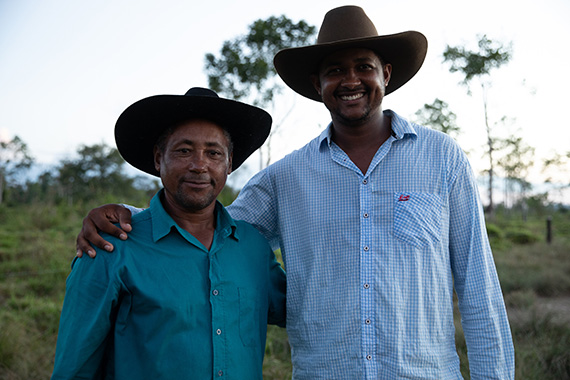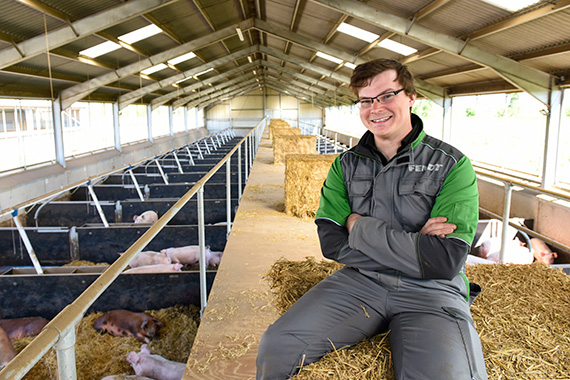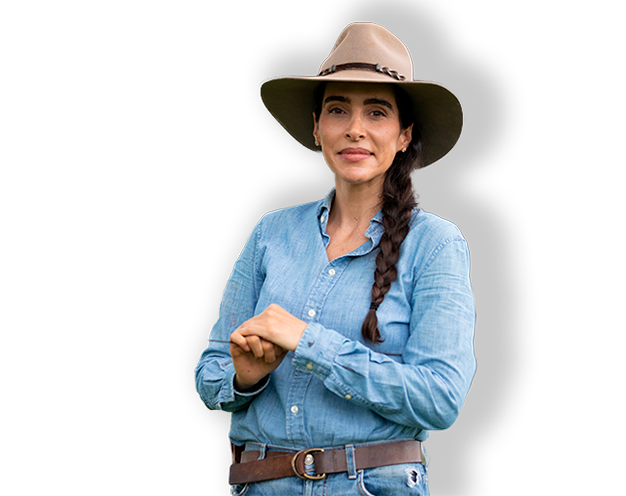Supplier Engagement and Support
(GRI 3-3)
JBS’s dedication to responsible sourcing goes beyond procurement; it’s a partnership built on shared values and long-term impact. By engaging directly with our suppliers, particularly those in rural communities, we aspire to help strengthen local economies, preserve agricultural traditions, and build social resilience. These relationships are essential not only for securing high-quality, sustainable commodities, but also for enabling smallholder farmers and local producers to thrive. Through transparent collaboration, capacity-building initiatives, and fair business practices, we work to foster a supply chain that supports inclusive growth and contributes to the enduring prosperity of the people and communities we depend on.
Responsible Sourcing
We work to establish relationships with our suppliers that are based on partnership and encourage the implementation of initiatives that improve their governance and practices. Guided by our Global Code of Conduct for Business Associates, we maintain an open dialogue with our suppliers on issues involving respect for the environment, human rights, and national and local labor laws. Through this code, we strive to ensure that our suppliers are compliant with applicable laws and regulations.
We evaluate all potential suppliers based on several criteria, including compliance, commercial offering, supply flexibility and responsiveness, service, risk management, quality, price, reliability, financial capability, reputation, and experience. Environmental and social impacts differ for each of our unique suppliers based on the region in which they operate, the materials they manufacture, the species of animal they raise, or the service they provide. Our ability to directly affect these impacts is often outside of our immediate control; however, we are dedicated to partnering with suppliers that share our values and mission to achieve a more sustainable food supply.
JBS Farm Assurance Program in Australia
At JBS Australia, we are committed to empowering producers and promoting sustainable farming practices that benefit both their operations and the environment. The JBS Farm Assurance (FA) producers and promoting sustainable farming practices that benefit both their operations and the environment. The JBS Farm Assurance (FA) program is a third-party audited beef and lamb supply chain initiative focused on food safety, animal welfare, quality assurance, and traceability for customers and consumers. Developed with producers, the program includes a traceable framework measuring on-farm practices across seven pillars: soils, pastures, vegetation, water, livestock, people, and carbon. Operating across four southern states where JBS FA producers farm in diverse biomes and climate conditions, the program emphasizes care for livestock and the unique landscapes from which the Great Southern brand’s supply chain originate.
In conjunction with Integrity Ag and Cibo Labs, the JBS FA program completed the world’s largest grassfed cattle carbon emission survey in 2024 with support from JBS Farm Assured cattle producers. With over 200 carbon surveys completed across southern Australia, the results showed that JBS Farm Assurance emissions baseline was 11.6kg CO2e/ kg live weight, which is 12% below the national Australian average.
Furthermore, in line with the program’s vegetation pillar, JBS FA promotes the management of healthy environments for cattle and sheep. Producer partners are encouraged to implement shelter belts, or rows of trees or shrubs strategically planted to provide natural protection from wind, sun, and rain. These shelter belts not only enhance animal welfare by offering shade and comfort but also support biodiversity by forming ecological corridors that allow native plants and wildlife to thrive. By connecting neighbouring farms, these green pathways contribute to a more resilient and interconnected ecosystem.
Partnering with agronomists and other key industry experts under the program’s pasture pillar, it is recommended that FA producers achieve 75% ground coverage of healthy grass on their properties through regenerative practices. This helps ensure livestock always have access to grass and supports the growth of native pastures vital to preserving farm biodiversity.
Beef Feeding Program (BFP) in the U.S.
By investing in programs that enhance productivity, promote environmental stewardship, and build resilience, the Beef Feeding Program (BFP) — managed by JBS USA Regional Beef—demonstrates our dedication to supporting producers and strengthening partnerships across the supply chain. This innovative bailment program empowers producers to optimize their operations by utilizing their own facilities and feedstuffs to finish cattle contracted back to our facility, creating opportunities for increased efficiency and profitability. In 2024, JBS USA partnered with four producers, primarily through our Souderton facility, to drive value through the BFP.
Additionally, JBS USA offers specialized programs tailored to meet the needs of different producers, such as:
- Imperial Wagyu
Both dairy and beef producers can breed their cows to JBS USA's Imperial Wagyu sires. At the time of breeding, producers can lock in pricing for their calves with a feeding operation, which in turn commits the cattle to our program. - Grass Runs Farms
This is an Angus all-natural grass-fed program that adds value to the cow-calf producer, backgrounder, and finisher. - Aspen Ridge
This is an Angus all-natural grain-fed program that adds value to the cow-calf producer, backgrounder, and finisher. - Cedar River Farms
This is an implant-free Holstein program.
Financial Program in Mexico
Pilgrim’s Mexico supports farmers through financial programs developed by its finance department and procurement assistance for equipment, vaccines, medicines, and services to secure better commercial conditions. Advisory services are provided on best practices and government regulations (carta porte) for logistics suppliers.
Restauramazônia Project in Brazil
The RestaurAmazônia project, coordinated by the Solidaridad Foundation and funded by the JBS Fund for the Amazon with support from the Elanco Foundation, helps smallholder farmers adopt agroforestry systems centered on cocoa, implement sustainable livestock practices, and restore degraded areas. Technical assistance is a core component of the project, and enables producers to improve productivity, access credit, and transition to low-carbon production.
By combining income generation with forest recovery, the project fosters resilient and sustainable rural development of farmers in the Amazon.
Cocoa
João Evangelista’s family experienced remarkable improvements in cocoa productivity thanks to the Agricultural Technical Assistance and Rural Extension (ATER) provided by the RestaurAmazônia project. With ATER’s guidance, João’s family increased their cocoa yield by 8%, significantly boosting their output. Their high-quality cocoa beans also earned them the prestigious Best Almond Award at the Cocoa Fair, further enhancing their market reputation. This recognition, coupled with increased sales, directly contributed to their economic stability and well-being.
Beyond João Evangelista’s household, other families receiving ATER through the project saw productivity increases of up to 90%, underscoring the transformative potential of technical assistance for smallholder farming systems in the Amazon.
Cattle
The RestaurAmazônia project’s emphasis on livestock productivity has also brought substantial benefits to families, with ATER playing a key role in enhancing cattle management practices. Two families supported by the project reported impressive productivity gains ranging from 47% to 108%. These improvements enabled them to transition from smallholders into direct suppliers of Friboi, opening the door to integration and collaboration.
The transformation also led them to implement traceability practices, further advancing transparency and accountability in livestock production. As a result, the families gained access to larger markets, secured better prices for their cattle, and saw a substantial increase in household income—while aligning with sustainable and ethical sourcing standards.
These success stories reflect the broader impact of the RestaurAmazônia project. By combining technical assistance, market integration, and land regularization, the initiative has enhanced productivity and improved livelihoods for rural families in the Amazon. By 2024, families involved in the project experienced an average income increase of 29%, driven by productivity gains and the adoption of sustainable practices.



